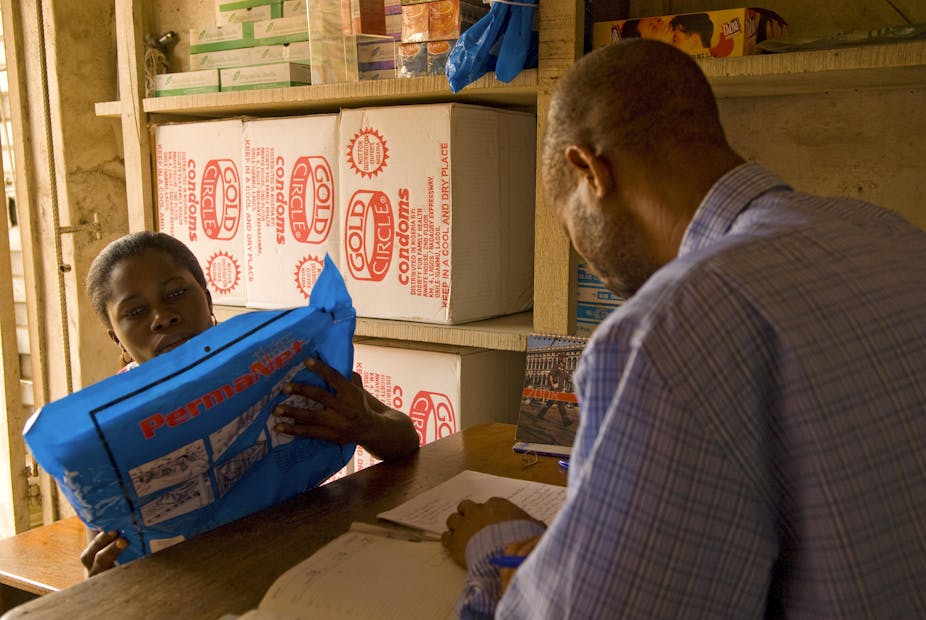With over 7.8 million cases of malaria, Nigeria has the highest caseload on the African continent. The disease remains one of the leading causes of avoidable death, especially in children and pregnant women.
It is also responsible for about 30% of the under five-year-old deaths and a quarter of the infants that die each year. About 11% of women die from malaria during childbirth.
But the cost of this heavy burden is falling squarely on individuals and households who are spending a significant amount of their monthly budget on malaria-related treatment and prevention.
And this cost burden is exacerbated by inefficiencies in the health system. For example, even though the government gives mothers and their children free health-care services in public hospitals, problems like drug stock outs mean that women have to pay for malaria treatment out of their own pockets.
This means that the financial burden falls on households as money is being diverted to medical costs as well as non-medical costs such as food and transport to and from health facilities.
To understand the cost burden, we did a study in two communities in Enugu State in southeast Nigeria with high malaria caseloads. We looked at the medical and non-medical costs for each episode of malaria.
We found that inefficiencies in the system were increasing the cost burden to individuals. And although the Nigerian government spent US$ 2.4 billion – or 1% of its annual health budget – on malaria alone in 2013, this only covered staff salaries and the running of facilities.
If this money was used more efficiently, for example on interventions such as controlling the disease with insecticide-treated bed nets, the incidents of the disease could be reduced. The overall effect would be to lower the cost of prevention and treatment. This would have an impact on government’s expenditure as well as individuals’ pockets.
In addition, the government would have more resources to allocate to other pressing health needs such as maternal and child health.
None of the costs are covered
Annually 50% of Nigerians suffer from at least one episode of malaria. Children under five have an average of two to four attacks of malaria a year. As a result, malaria is responsible for about 60% of the outpatient visits to health facilities.
Malaria treatment is divided into in- and out-patient services.
In-patient services: This includes the treatment of severe cases of malaria and can include consultations, laboratory tests and medication.
Out-patient services: This covers uncomplicated cases of malaria as well as preventive services such as providing patients with long lasting insecticide-treated nets and preventive drugs during pregnancy.
Officially, there are a number of policies which – on paper at least – offer health care services to deal with malaria.
On paper pregnant women and children under five are entitled to free malaria treatment. But, in reality, not all states offer these free services. And even when they do, drug stock outs at public hospitals mean mothers have to turn to drug shops or itinerant drug sellers for medication.
On top of this the country has a voluntary national health insurance scheme to reduce the burden of illness borne by individuals. The scheme provides a generous benefit package (covering preventive and curative services) to employees of the federal government. But this covers only less than 5% of the Nigerian population. The informal sector, where most people work, is excluded.
Because the interventions are not actually working, we found that over 65% of all health expenditures in the country is borne by households through out-of-pocket spending.
The problem is that more than 48.4% of Nigerians live below the poverty line. Most people spend all their money on food. The high household expenditure on malaria leads to people being unable to meet other basic household needs, such as having enough food to eat.
Changing the approach
Reducing the malaria cost burden on Nigerians requires a multi-pronged approach. This entails addressing the high level of economic burden of malaria through concerted and sustained malaria preventive efforts.
But more people would also need to take up risk protection mechanisms to buffer both direct and indirect treatment costs.
For health system and policy research, the best practices of risk pooling and risk protection mechanisms which are suited to the developing country context need to be investigated to get an optimal uptake with people.

